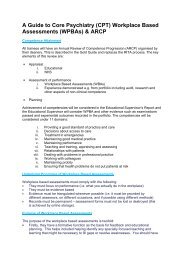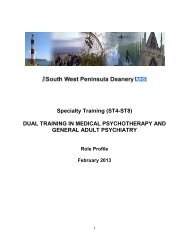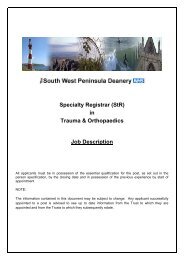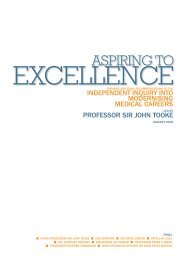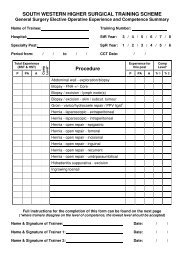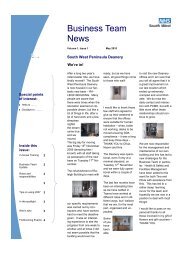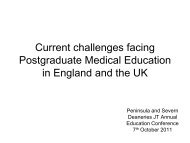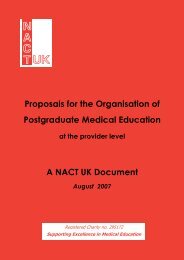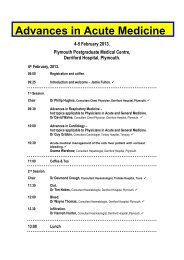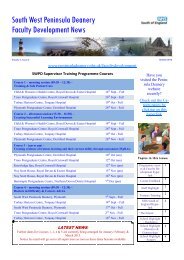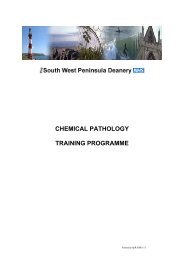General Trust Information - South West Peninsula Deanery
General Trust Information - South West Peninsula Deanery
General Trust Information - South West Peninsula Deanery
Create successful ePaper yourself
Turn your PDF publications into a flip-book with our unique Google optimized e-Paper software.
F1<br />
FOUNDATION PROGRAMME<br />
2013<br />
Foundation Programme F1<br />
Page 1 o f9 reviewed June 2012
PLYMOUTH HOSPITALS NHS TRUST<br />
Foundation Programme – F1<br />
INTRODUCTION<br />
Plymouth Hospitals NHS <strong>Trust</strong> is one of the largest providers of acute care in the<br />
country and is the major tertiary referral centre for the <strong>South</strong> <strong>West</strong> <strong>Peninsula</strong>. Derriford<br />
Hospital is designated as a major trauma centre, receiving patients from a wide area of<br />
Devon and Cornwall via the Air Ambulances. The managed population for the Hospital<br />
amounts to 430,000 and includes southeast Cornwall. This number expands considerably<br />
during the holiday seasons. The <strong>Trust</strong> has an annual income of £240 million; employs in<br />
excess of 6,000 staff and accommodates 1,200 beds in the main building.<br />
Derriford Hospital opened in 1981 and has gradually expanded to replace the four major<br />
acute hospitals in Plymouth in existence at that time. The site was chosen just outside the<br />
City limits to facilitate this expansion. The availability of adjacent land has permitted the<br />
development of a ’Medical City’ as local planners concentrate medical developments<br />
within this area. Specifically the acquisition of land has enabled the following<br />
developments to take place:<br />
A Science Park adjacent to the Hospital that includes the Diving Diseases Research<br />
Centre, Medical Innovations Centres and the new Undergraduate Medical School<br />
buildings.<br />
The relocation of the Royal Eye Infirmary.<br />
A new rehabilitation unit dedicated to stroke, neuro and orthopaedic rehabilitation.<br />
An extensive new build on the main Hospital comprising nine floors, including a major<br />
new critical care facility, rebuild of cardiac theatres and a new library floor together<br />
with research and teaching accommodation.<br />
Radiology academy – Department of Health initiative.<br />
New residential buildings for Hospital staff<br />
New adult mental health facilities are being provided on the Mount Gould site in the City<br />
Centre and there are three new local care centres in the City offering day care, minor<br />
injury services, rehabilitation, etc.<br />
The <strong>Trust</strong> is a Cancer Centre. Organisation and development of cancer services<br />
continues to grow in response to the increasing local requirements and national<br />
government initiatives. The <strong>Trust</strong> fully subscribes to a multidisciplinary approach and<br />
provides the infrastructure and services that would be expected from a major programme,<br />
including a purpose built Oncology Centre established on site in 1997. A major feature in<br />
this Centre is the Clinical Research Trials Unit.<br />
The <strong>Trust</strong> is developing rapidly as a centre for research in partnership with the <strong>Peninsula</strong><br />
College of Medicine and Dentistry and Plymouth and Exeter Universities. The <strong>Trust</strong><br />
received one of the first National Institute of Health Research grants in the <strong>South</strong> <strong>West</strong><br />
and our staff are an active part of one of the first clinical trials units to be registered by the<br />
UK Clinical Research Networks. The <strong>Trust</strong> are also a successful partner in the recently<br />
designated <strong>Peninsula</strong> Collaboration in Applied Health Research and Care (PenCLARHC)<br />
On 3 November 1997 the new <strong>South</strong> <strong>West</strong> Cardiothoracic Centre was opened. The<br />
Centre has now carried out over 6,000 open heart procedures and provides a service for<br />
patients who previously had to travel substantial distances for treatment. It is worth noting<br />
that in the three years 1999 – 2001 the Society of Cardiothoracic Surgeons placed<br />
Foundation Programme F1<br />
Page 2 o f9 reviewed June 2012
Plymouth first for survival rates following CABG and aortic valve surgery, out of all 38<br />
heart surgery units in the UK.<br />
The <strong>South</strong> <strong>West</strong> Neurosurgical Centre was the first tertiary service to be based at<br />
Plymouth and commenced work in 1975. It is rapidly expanding its range of neurosurgery,<br />
bone marrow transplant and renal transplant services, its staff and its accommodation.<br />
The <strong>Trust</strong> provides tertiary services (neurosurgery, maxillo facial surgery, plastic surgery,<br />
cardiac and thoracic surgery, renal transplantation, bone marrow transplantation,<br />
radiotherapy and oncology for rarer tumours), for a population of up to 2 million people<br />
living in Devon, Cornwall and Dorset.<br />
Work started in 1990 towards the establishment of an Undergraduate Medical School in<br />
the <strong>Peninsula</strong>. Plymouth spearheaded this with the development of a Postgraduate<br />
Medical School that became operational in 1995 followed by the establishment of an<br />
Undergraduate Medical School – the <strong>Peninsula</strong> Medical School – which opened in<br />
October 2002 as a joint venture between the Universities of Plymouth and Exeter. The<br />
new School is enthusiastically supported across the whole <strong>Peninsula</strong>. In the 2002/2003<br />
academic year the intake was 130 students. The first cohort of students commenced their<br />
clinical studies at Truro, Exeter and Derriford in September 2004, with 40 based at<br />
Derriford.<br />
The Royal Naval Hospital (Stonehouse) closed in 1995 and its medical headquarters at<br />
the Derriford site (including nurses and other military healthcare workers) was<br />
incorporated into Derriford Hospital. The services are now fully integrated into the Hospital<br />
and provide medical facilities for the Military Services based in Plymouth in addition to full<br />
participation in the provision of local civilian hospital care.<br />
For more information, please visit the <strong>Trust</strong>’s website at<br />
http://www.plymouthhospitals.nhs.uk<br />
ATTRACTIONS AND LEISURE<br />
To the northeast lies the rugged and virtually unpopulated Dartmoor National Park. On its<br />
western edge sits the unspoilt market town of Tavistock, at the centre of one of the most<br />
beautiful farming areas in the <strong>West</strong> Country. To the east of Plymouth, the <strong>South</strong> Hams<br />
boasts many charming villages, unspoilt beaches and fishing ports. The <strong>South</strong> Devon and<br />
Cornwall coastlines are within easy reach and there are regular cross Channel ferry<br />
services to Brittany and Northern Spain.<br />
Plymouth and its surrounds in south Devon and Cornwall comprise one of the major<br />
outdoor leisure areas in the UK. Activities include seaside sports such as surfing,<br />
windsurfing and sailing plus access to unlimited walking opportunities at whatever level<br />
(Dartmoor, Bodmin Moor, coastal footpaths).<br />
Derriford Hospital is fortunate to have a purpose-built Leisure Centre comprising excellent<br />
gymnasium, squash and sports hall facilities. The Centre was built in 1990 and is well<br />
used by a wide range of staff, both for exercise and social functions.<br />
More recently, the Devonshire Sports & Racquet Club has opened opposite the Hospital<br />
and in addition to somewhat newer exercise facilities it provides a large swimming pool.<br />
There is an active Junior Doctors mess with events planned throughout the year including<br />
“Payday” nights out, Balls and other social events. The mess also has its own sailing boat<br />
available for use by Junior Doctors. The mess also has 7 IT workstations for dedicated<br />
use by Junior Doctors.<br />
Foundation Programme F1<br />
Page 3 o f9 reviewed June 2012
EDUCATION/TRAINING<br />
Director of Medical Education<br />
Dr Hiu Lam, Consultant Anaesthetist.<br />
The Director of Medical Education carries overall responsibility for the implementation and<br />
development of Medical Education within the <strong>Trust</strong>.<br />
Deputy Director of Postgraduate Medical Education<br />
Dr Wai Tse, Consultant Renal Physician<br />
The Deputy Director of Postgraduate Medical Education carries overall responsibility for<br />
the implementation and development of Postgraduate Medical Education within the <strong>Trust</strong>.<br />
Foundation Programme Training Directors/ Clinical Tutors<br />
The clinical tutors have a general role in providing support, information, career guidance<br />
and help in implementing and developing the foundation programme in the <strong>Trust</strong>, amongst<br />
other duties. They can be contacted via the Postgraduate Medical Centre office or<br />
individual pagers<br />
Current Foundation Programme Training Directors are:-<br />
Dr I Higginson<br />
Dr Sarah Pascoe<br />
Mr Matthew Bowles<br />
Consultant Emergency Physician<br />
Consultant Oncologist<br />
Consultant Surgeon<br />
Postgraduate Medical Education Team<br />
Linda Atkinson-Lewis Foundation Programme Manager<br />
Mike Pengelly Postgraduate Medical Centre Manager<br />
Sandra Phillips Foundation Programme Administrator<br />
Sue Coleman Specialty Training Course Co-ordinator<br />
Helen Lavis Postgraduate Centre Receptionist/ Junior Study Leave<br />
Lorraine Veale GPVTS/TPD administrator<br />
This team should be your first point of contact regarding general foundation programme<br />
queries and questions.<br />
Educational Supervisors<br />
Each F1 doctor will be allocated a named educational supervisor for the whole year. The<br />
educational supervisor is responsible for facilitating the training and educational<br />
development of their junior doctors. They will meet with their trainees regularly to ensure<br />
that foundation trainees receive appropriate training and experience, deciding whether<br />
individual placements have been completed, assisting with personal development<br />
planning and ultimately signing off the doctor’s portfolio for GMC registration. Additionally,<br />
trainees will be working under clinical supervisors in each of the different specialties in<br />
their rotation.<br />
Learning objectives<br />
To provide the trainee with the knowledge, skills and attitudes to be able to:<br />
Foundation Programme F1<br />
Page 4 o f9 reviewed June 2012
Take a history and examine a patient<br />
Identify and synthesize problems<br />
Manage time and clinical priorities effectively<br />
Communicate effectively with patients, relatives and colleagues<br />
Use evidence, guidelines and audit to benefit patient care<br />
Prescribe safely<br />
Keep an accurate and relevant medical record<br />
Act in a professional manner at all times<br />
Cope with ethical and legal issues which occur during the management of patients<br />
with general medical conditions<br />
Become life-long learners and teachers<br />
Appraisal and Assessment<br />
This will take place at regular intervals throughout the appointment in accordance with<br />
Foundation Programme guidelines, GMC requirements and agreements with the <strong>South</strong><br />
<strong>West</strong> <strong>Peninsula</strong> Postgraduate <strong>Deanery</strong>. There will be regular competency assessment<br />
based on the Foundation Programme Curriculum.<br />
<strong>General</strong> Education<br />
Mandatory bleep free weekly teaching session in the PGMC on Tuesdays – 13.30-16:00<br />
(including coffee break)<br />
Teaching based on the Foundation Programme Curriculum.<br />
Development of a skills training centre which will underpin ward based training.<br />
ROTATIONS<br />
The F1 programme includes twenty 3 X 4 month rotations. This enables every doctor to do<br />
at least 3 months general surgery and 3 months general medicine. The order of your<br />
rotation is not necessarily in the order shown.<br />
All posts are based at Plymouth Hospitals NHS <strong>Trust</strong> for the full year of the rotation.<br />
Rotations and posts have been pre-allocated to the foundation schools we are linked with,<br />
applications should be sent direct to the relevant foundation school for the rotation<br />
requested.<br />
A number of rotations are also allocated to the MOD, allocation to these posts is made<br />
directly by the MOD.<br />
Foundation Programme F1<br />
Page 5 o f9 reviewed June 2012
1 Neurosurgery Gastroenterology<br />
2 Geriatric Medicine<br />
3 Paediatrics Geriatric Medicine<br />
4 Colorectal Surgery<br />
Upper Gastrointestinal and<br />
<strong>General</strong> Surgery<br />
Clinical Oncology & Upper Gastrointestinal and<br />
Palliative Medicine <strong>General</strong> Surgery<br />
Respiratory<br />
Medicine<br />
Upper Gastrointestinal and<br />
<strong>General</strong> Surgery<br />
Intensive Care<br />
5 Colorectal Surgery Gastroenterology Emergency Medicine<br />
6<br />
7<br />
8<br />
Upper Gastrointestinal Respiratory<br />
and <strong>General</strong> Surgery Medicine<br />
<strong>General</strong> Surgery<br />
Acute Medicine<br />
(Vascular)<br />
Upper Gastrointestinal<br />
Geriatric Medicine<br />
and <strong>General</strong> Surgery<br />
9 Neurosurgery Gastroenterology<br />
Respiratory<br />
10 Colorectal Surgery<br />
Medicine<br />
<strong>General</strong> Surgery<br />
11<br />
Acute Medicine<br />
(Vascular)<br />
Respiratory<br />
12 Colorectal Surgery<br />
Medicine<br />
Paediatrics<br />
Urology<br />
Intensive Care<br />
Clinical Oncology & Palliative<br />
Medicine<br />
Emergency Medicine<br />
Paediatrics<br />
Obstetrics & Gynaecology<br />
13 Urology Acute Medicine Obstetrics & Gynaecology<br />
14 Colorectal Surgery<br />
15<br />
Upper Gastrointestinal Respiratory<br />
and <strong>General</strong> Surgery Medicine<br />
16 Gastroenterology<br />
Endocrinology and<br />
Obstetrics & Gynaecology<br />
Diabetes Mellitus<br />
Emergency Medicine<br />
Upper<br />
Gastrointestinal and Breast Surgery<br />
<strong>General</strong> Surgery<br />
18 Emergency Medicine Acute Medicine Colorectal Surgery<br />
Foundation Programme F1<br />
Page 6 o f9 reviewed June 2012
GENERAL ISSUES<br />
Induction<br />
Medical staff induction day takes place on the Tuesday 24 th July 2012 at the Postgraduate<br />
Medical Centre for all F1 doctors.<br />
All F1 doctors are required to attend a mandatory period of shadowing on the 25th July,<br />
2012- 31 st July, 2012.<br />
All junior doctors will also be provided with Specialty specific induction programmes as<br />
they rotate through each specialty.<br />
Occupational Health<br />
The <strong>Trust</strong> has an occupational health centre on site which provides a full range of<br />
services, including counselling, to Junior Doctors and all other staff on site. In addition to<br />
the services offered by the occupational health centre the <strong>Trust</strong> offers junior doctors<br />
access to the one to one support service provided by the <strong>Deanery</strong>. You must be<br />
Occupational Health cleared prior to commencement of employment.<br />
Security<br />
All Junior doctors will be provided with a photographic ID card which must be worn at all<br />
times, in addition the <strong>Trust</strong> has a security advisor and security centre on the grounds, the<br />
centre houses <strong>Trust</strong> Security staff and provides a base for local community police officers.<br />
Accommodation<br />
Accommodation is available to rent in the new studio flats (built August 2007).<br />
Each unit has fitted wardrobes, desk, settee, dining table and chairs. Phone, broadband<br />
access and digital TV channels are also included. There is a separate kitchen, fully fitted;<br />
including a washer/dryer, microwave incorporating an oven, kettle, toaster and a fridge<br />
freezer. The self contained toilet and shower has a range of fitted cupboards, mirror lights<br />
and heated towel rail. The floors throughout are easy clean, wood laminate in the<br />
bedroom/lounge and vinyl in the kitchen and bathroom. There is a video entry phone<br />
system and each of the 3 blocks has a separate swipe card entry system, which also<br />
controls the car park barrier. Lockable cycle sheds are also provided.<br />
The external grounds and landscaped gardens are monitored by CCTV cameras linked to<br />
the hospital control room and the external lighting is linked to motion detectors. The fire<br />
alarm system is state of the art and incorporates the latest digital technology and is<br />
automatically linked to the <strong>Trust</strong> switchboard. There is a separate 8 person lift in block.<br />
A residences office is located on the ground floor of Block 3, this is open from 8.30 am till<br />
5.00 Monday to Friday. Out of hours there is an emergency call number. All public areas<br />
will be cleaned on a regular basis.<br />
Access to meals etc<br />
The <strong>Trust</strong> provides access to hot and cold meals in a restaurant and separate café area,<br />
the restaurant provides hot and cold food till 7pm.<br />
Foundation Programme F1<br />
Page 7 o f9 reviewed June 2012
Library Facilities<br />
The Junior Doctors will have full access to the <strong>Trust</strong>’s Library (books, Journals and on-line<br />
journals/articles) and IT systems. The new Discovery Library opened at Derriford in 2007<br />
and houses brand new facilities in a contemporary space.<br />
GENERAL WORK REQUIREMENTS<br />
The appointee will have continuing responsibility for the proper function of the work.<br />
The appointee will undertake administrative duties associated with the running of his/her<br />
clinical work.<br />
The appointee will be expected to take a full part in professional activities including,<br />
clinical audit, clinical governance, training and quality assessment.<br />
It is a requirement that if the employee has concerns about the professional performance<br />
of a member of the medical staff, they have a duty to speak to the person concerned. If<br />
the matter is potentially serious, or satisfaction is not obtained with the direct approach,<br />
such concerns should be discussed with the Clinical Director, if satisfaction is again not<br />
obtained, concerns should be discussed with the Medical Director.<br />
Leave<br />
Leave arrangements will be agreed within the specialty so as to maintain adequate cover<br />
and you may be asked to assist other ‘take’ firms at particularly busy periods. Leave must<br />
be taken within each speciality and cannot be carried over into your next rotational slot.<br />
Ensure that you are familiar with the <strong>Trust</strong>s Sickness & Absence Policy and the<br />
requirements on reporting and returning to work -<br />
ACCESS TO CHILDREN<br />
The person appointed to this post may have substantial access to children under the<br />
provisions of Joint Circular No. HC (88) 9 HOC 8/88 WHC (88) 10. Applicants are,<br />
therefore, advised that in the event that your appointment is recommended you will be<br />
asked to complete a form disclosing any convictions, bind-over orders or cautions, and to<br />
give permission in writing for a police check to be carried out. Refusal to do so could<br />
prevent further consideration of the application. Attention is drawn to the provisions of the<br />
Rehabilitation of Offenders Act 1974 (Exceptions) Order 1975 as amended by the<br />
Rehabilitation of Offenders Act 1974 (Exceptions) (Amendment) Order 1986, which allow<br />
convictions that are spent to be disclosed for this purpose by the police and to be taken<br />
into account in deciding whether to engage an applicant.<br />
REHABILITATION OF OFFENDERS<br />
This post is not protected by the Rehabilitation of Offenders Act, 1974. You must disclose<br />
all information about all convictions (if any) in a Court of Law, no matter when they<br />
occurred. This information will be treated in the strictest confidence.<br />
Foundation Programme F1<br />
Page 8 o f9 reviewed June 2012
DATA PROTECTION ACT 1998<br />
Candidates are informed that the information given by them in application for the post will<br />
be used only for the recruitment and selection process. For successful candidates this will<br />
then form part of their personal file, and for unsuccessful candidates the information will<br />
be destroyed. The information is stored both in hard copy form and minimally on a<br />
database. This information is held and administered in line with the Data Protection Act<br />
and the <strong>Trust</strong>’s confidentiality procedure.<br />
Foundation Programme F1<br />
Page 9 o f9 reviewed June 2012



